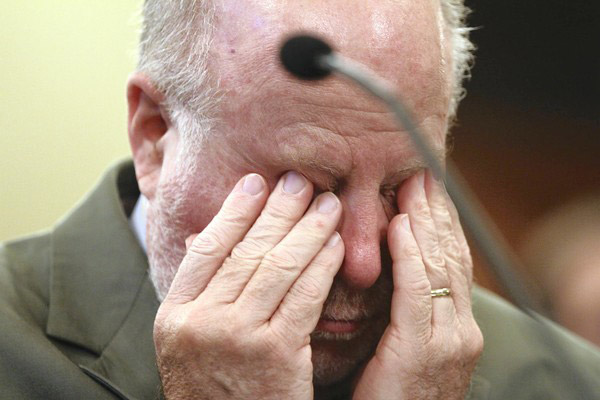
Governor's budget-office director Jerry Stermer
Over the past couple days pension reforms got passed around like hot rocks in the legislature, as reforms were introduced bright and early in the morning by House Democrats; then Michael Madigan was like, here, you take it, passing off sponsorship to Tom Cross shortly after going at it over pensions. This was probably the most important thing written about the whole mess:
No one seems to like the bill, including Cross who opposed it on Wednesday.
"There will never be anybody jumping up and down [over it]," Cross told reporters. "This is a bill drafted by the Speaker. I was handed this bill last night."
So, yeah, it died.
This leads us back to a good piece by Jason Grotto and Ray Long on Illinois legislative pensions, which are both very generous and very underfunded.
[Emil] Jones' good fortune comes courtesy of legislation he sponsored in 1989. Under that law, members of the General Assembly who worked long enough to hit their limit on pension benefits — a generous 85 percent of their final salary after just 20 years — would get an extra reward.
For every additional year they stayed on, 3 percent of their initial pension would be added to their retirement checks. For Jones, working an extra 16 years netted him a $41,000 pension boost in 2009; he drew $126,004 last year.
The 3 percent deal, available to no one in state government outside of the General Assembly Retirement System, or GARS, is another in a long line of pension provisions written by lawmakers for lawmakers, a Tribune investigation found. It also stands as a glaring example of how the legislature repeatedly passed benefit increases with little or no concern for the costs.
How's GARS doing? It's a mess, 21.2 percent funded as of fiscal year 2011: $63 million in assets, $298.4 million in liabilities. It has 410 annuitants, 86 "inactive participants entitled to benefits but not yet receiving them"… and 180 total particpants. Since the fund is supported in part by employee contributions, it's a terribly unhealthy ratio. (In 2006, assets were over $82 million and liabilities were under $222 million).
It's the worst-funded retirement system in the state. Jones, as the piece notes, would have had to double his contributions over his tenure to fully fund his pension.
Of course, you're supposed to get more than you put in, via investment returns and risk-sharing. But the returns have to be balanced against the risk-sharing purpose of the fund, which is why Jones's explanation for the legislation is so concerning:
Today Jones still says the "accrual" provision for longtime lawmakers was fair, noting that legislators were required to pay 11 percent of their salary into the system even after they had reached their maximum pension benefit.
"I understood what it did," he said. "You're still paying a large percentage of your salary, and you get nothing for it."
But it's not nothing: the future health of the fund, stability in retirement for those who served less or made less money than Jones, not to mention a more reasonable replacement rate, i.e. under 100 percent. Pensions aren't just about financial risk, they're about societal risk, which is why some have suggested capping defined benefits, at, say, average state incomes.
Keep it in context, however: there aren't vast populations of legislators pulling down six-figure pensions. In 2011, GARS was paying out monthly benefits of $8,001 and up to 35 people. The average was $4,349 per month, and the biggest cohort is the $1,001-2000 range. The problem isn't that legislator pensions are going to sink the state—GARS paid out about $17 million in 2011, most of that at comparable rates to other public servants. It's the most screwed-up pension fund in the state, but it's also small, and thus easier to fix.
The concern, as I described it before, is broken-windows pension policing: the people in charge of the pension rules have the worst pension fund, and if Jones is any indication, an entirely wrongheaded understanding of what pension funds are for and how they work. It's another reason that the implosion of the pension-fund reform bill is no surprise.
But it's not entirely a bad thing. Whatever changes are made are sure to be challenged, though there's a sweetner there, of course: "the major exception is judges, who were left out to increase the plan's chance of withstanding a court challenge." It was also hastily and clumsily handled; Rich Miller acknowledged that Tom Cross and even Mike Bost had a point about a lack of due diligence in negotiations. The uncertain future of the pension-reform bill should be less worrisome than the uncertain future of GARS.
Photograph: Chicago Tribune



